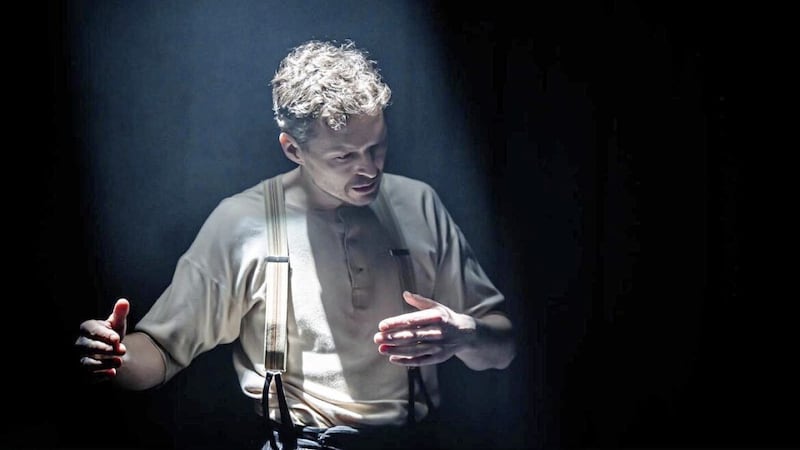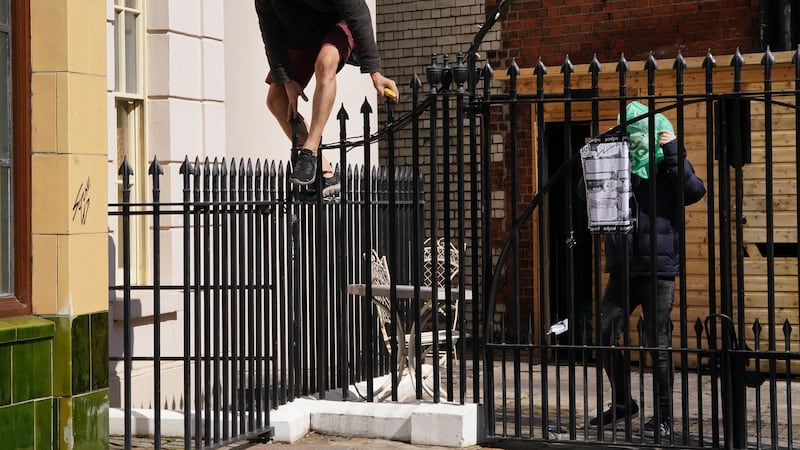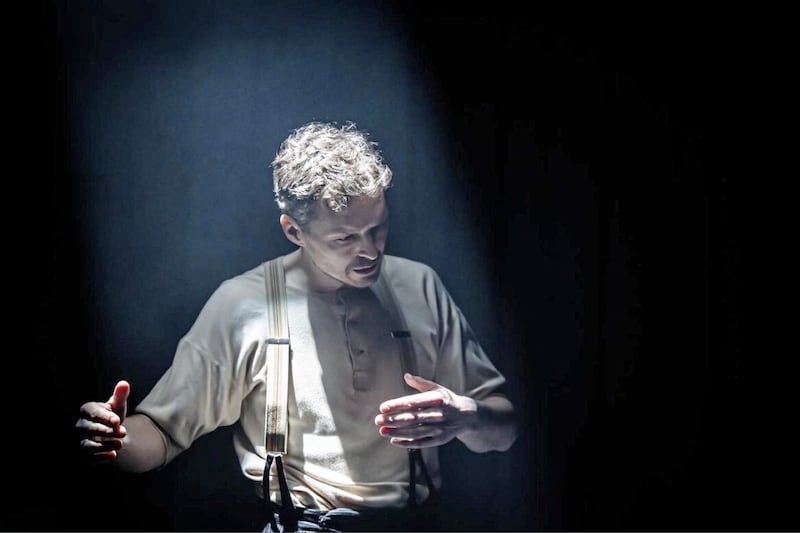"FOR the rest of his life, my grandfather was on this search to try and work out why he had survived and all these other men hadn't," explains playwright, actor and musician Richard Clements of what inspired him to pen How to Bury a Dead Mule, a one-man show based on his late grandfather's Second World War experiences and the effect undiagnosed Post Traumatic Stress Disorder (PTSD) had on his family.
Directed by Matthew McElhinney (Stones in His Pockets, One Night in November), Bangor-born Clements portrays his grandfather Norman Clements as he recalls his time as an Irish Fusilier severely injured on the front line.
Having staged an early version at the Lyric theatre's McNaughton Studio back in March, Clements and co are currently preparing to bring a newly revised and Northern Ireland Screen Digital Film Archive-enhanced version of the play to the Lyric for a full week in early September.
How to Bury a Dead Mule's striking title reflects an actual battlefield incident in which Norman Clements narrowly survived a brush with death when a fellow soldier failed to follow orders correctly.
"He was in North Africa," explains Clements, who has also written the original score for the piece.
"There was a dead mule by the side of the road, and this private he was with was ordered to bury it. But he just set it on fire instead, and the smoke attracted German bombers. As a result, the private and four or five others died.
"The idea of the dead mule sort of represented the futility of war – just the stupidity of little decisions and where they lead you."
With its roots in a series of musical experiments during the first lockdown of 2020 before evolving into a spoken word piece (narrated by Matthew McElhinney's father, Ian) and then a one-man show, How to Bury a Dead Mule has long been a personal passion project for its creator.
"I think the story has kind of been in my head for 25 years – I just sort of needed to find a way into it," he explains.
"The real turning point was in deciding to explore what happened to him when he came home with severe PTSD. I thought 'wouldn't it be really interesting to juxtapose what was happening to him post-war with the kind of young idealism of heading off to the frontline?'.
"The play takes place in the old Tonic Cinema in Bangor, which is where he passed away in 2011, in the care home that's now on the site. I had this idea of him conjuring up the spirit of the old cinema and sort of inviting in the ghosts of the soldiers that had died around him, saying, 'right, this is my time to tell my story'."
Indeed, the play does not shy away from the fact that, like so many of his generation, Norman Clements initially saw going off to war as a great adventure.
"My grandfather volunteered," explains Clements, who bears an uncanny resemblance to the late veteran.
"It was an adventure for him, a chance to see the world. And actually, right up to the day he died, he never stopped talking about how brilliant it was to be in North Africa and Italy and Sicily, to see those places and experience them, because he never got a chance to go back.
"But he also had this kind of hyper focus with reliving the past, retreading the old trails. He became sort of obsessed with number sequencing and maps, and just trying to reach a conclusion as to why it had all happened. And he railed against authority for the rest of his life – y'know, why did people in positions of authority put people like him in that position?
"So what you've got is a piece that kind of looks in a fragmented way at three different periods in his life, and with the real emphasis being on trauma and the impact of that on him and his family."
As audiences will discover, the Norman Clements who returned from the war was much changed from the young and idealistic man who went willingly off to battle.
"He was very severely wounded in 1944 and then declared unfit for service," explains Clements.
"He couldn't see for a long time, he had shrapnel wounds in the head and a fractured leg. And when he came back, he really struggled to hold down work. He was given this diagnosis of 'environmental schizophrenia' and he was frequently in and out of mental health institutions.
"The impact that had on my grandmother in particular was huge. But when you're a kid and you grow up in that kind of atmosphere, you just go 'well, that's just grandad being grandad'. It's only years later, that you start to reflect on it in a slightly more refined way."
Appropriately, family also played a big part in getting How To Bury a Dead Mule off the ground: Clements's mother had the foresight to document some of Norman's war experiences before he passed away.
"Mum would invite him down from the care home for lunch: he'd be sitting there having a sandwich and a cup of tea and she'd say, 'Remember that time you told me that story about... just tell me that again?'.
"Unbeknownst to me, she'd recorded him. When I had this idea of writing the play, she called me and said, 'Well, you know, I'm starting to type up the transcripts'. So there's lots of language within the play that comes right from the horse's mouth."
The actor is keen to point out that he still has fond memories of visiting his grandparents' home as a child.
"Grandad was a colourful character, full of life – that's the one thing I remember," he enthuses.
"As kids we'd be sent up to spend the weekend with them while mum and dad were away. I just remember these mad nights of the cousins all coming round on warm summer nights, us sitting around eating fish suppers and my granny singing and telling stories and being able to stay up until whatever time we wanted.
"Then he'd wake me up at five in the morning and say, 'Come on, son, we're going to walk for five miles', and we'd go to see my uncle on the other side of town. Things were always kind of 'on the move' with him and there was something really lovely about that, in terms of the family memories."
Depressingly, given the exploration of PTSD within How To Bury a Dead Mule, its themes remain extremely relevant to modern times.
"The scenarios on the battlefields change, but the symptoms that these men experience and the impact of those symptoms on their family members is exactly the same," says Clements.
"One of my supporters in this project is the NI Veterans' Support Office, who talked to me a lot about the support networks that are now in place – but men like my grandfather had nothing.
"They had absolutely nowhere to turn to. They were given a lump sum of money and told to get on with it. And they came back to a Belfast that just wasn't able to cope at all with their trauma.
"So it's a play that looks at male mental health, the idea of what it means to be a man and toxic masculinity. But there's so much humour to it as well, because grandad did these massively surreal and absurd things at times. You can't help but laugh, and at the same time be affected by what was behind it."
As you might expect, writing and performing such a personal show has been an emotional experience for Clements.
"The hardest thing was sharing it with my mum," he tells me.
"Because I wanted her to say, 'Yeah, that sounds like him'. And she gave it a big thumbs up – she was very much in approval of it.
"Now, I've learned to distance myself a little bit and see my grandfather as representative of all of those men who suffered in that way. I'm not just telling his story – I'm telling all of their stories at the same time."
:: How to Bury a Dead Mule, September 6 to 10, Lyric Theatre, Belfast. Tickets and showtimes via lyrictheatre.co.uk. There will be a post-show panel discussion on PTSD on September 7 chaired by Cherie Armour, Professor of Psychological Trauma and Mental Health at QUB's School of Psychology.








